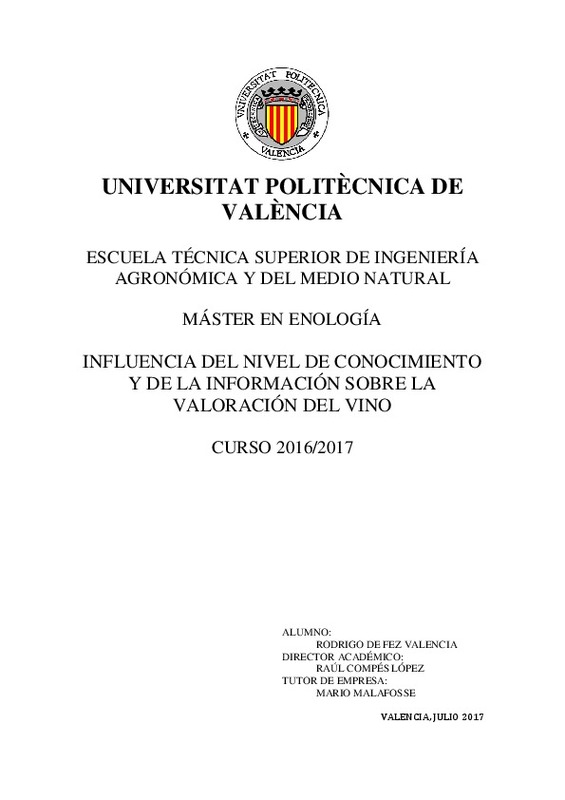JavaScript is disabled for your browser. Some features of this site may not work without it.
Buscar en RiuNet
Listar
Mi cuenta
Estadísticas
Ayuda RiuNet
Admin. UPV
Influencia del nivel de conocimiento y de la información sobre la valoración del vino
Mostrar el registro sencillo del ítem
Ficheros en el ítem
| dc.contributor.advisor | Compes López, Raúl
|
es_ES |
| dc.contributor.advisor | Malafosse, Mario
|
es_ES |
| dc.contributor.author | Fez Valencia, Rodrigo de
|
es_ES |
| dc.date.accessioned | 2017-09-22T07:56:35Z | |
| dc.date.available | 2017-09-22T07:56:35Z | |
| dc.date.created | 2017-07-24 | |
| dc.date.issued | 2017-09-22 | es_ES |
| dc.identifier.uri | http://hdl.handle.net/10251/87815 | |
| dc.description.abstract | [ES] En el negocio vitivinícola global cada vez tienen más importancia los premios y las valoraciones de los vinos efectuadas por críticos y prescriptores. Estas son vitales a la hora de diferenciarse y posicionarse en un sector extremadamente competitivo en el que el valor comercial del producto está cada vez más influido por los factores intangibles asociados al vino. Aunque se trate de expertos, estas valoraciones son subjetivas, ya que dependen de sus gustos y preferencias. Adicionalmente, pueden existir sesgos derivados del tipo de cata, en particular en las catas vistas, técnica muy usadas en este tipo de valoraciones. Todos estos factores explican que haya surgido una línea de investigación para intentar medir el grado de consistencia de las opiniones de los expertos y la importancia de los sesgos asociados a los distintos tipos de cata. En este marco, esta comunicación se presenta un experimento llevado a cabo en Valencia (España) con dos objetivos: en primer lugar, determinar el “efecto experto” y, en segundo lugar, medir el “efecto información”. Los resultados permiten afirmar que el efecto experto existe y es positivo, al igual que el efecto información. Esto significa que el crítico o catador experto tiene una capacidad especial para valorar un vino, pero también que está sometido a sesgos derivados de la información disponible sobre un vino. Estos resultados deberían servir para revisar los criterios de selección de expertos y los protocolos de guías y concursos de vinos. | es_ES |
| dc.description.abstract | [EN] In the global wine business, awards and evaluations of wines made by critics, experts and prescribers are increasingly important, these are vital in differentiating and positioning themselves in an extremely atomized sector in which the commercial value of a product Is more opted for extrinsic factors than the own ones of the wine. These ratings are subjective because they are based on the tastes and preferences of the experts. Additionally they are controversial, since they are subject to the inherent biases of the tastings seen, technique that usually is used in this type of valuations. All these factors explain why a line of research has emerged to try to measure the degree of rigor of expert opinions and the importance of biases associated with tastings that are less impartial than blind tastings. In this communication, the results of an experiment done in Valencia (Spain) are presented. It’s aim is double in this case: intends, in first instance, determining the “expert effect” of the evaluator - is his evaluation better because he knows more? - and, in second place, measure the “information effect” - how is the available information affecting his opinion during the test? -. After the final analysis we can verify that the expert effect exists and is positive, as well as the information effect. Therefore the figure of the expert is obvious, but it is influenced by the biases derived from the perceived information. The objective is to highlight the importance of these biases involved in the valuation of a wine and not to criticize the figure of the expert, every day more necessary in the global wine business. | es_ES |
| dc.format.extent | 34 | es_ES |
| dc.language | Español | es_ES |
| dc.publisher | Universitat Politècnica de València | es_ES |
| dc.rights | Reserva de todos los derechos | es_ES |
| dc.subject | Efecto información | es_ES |
| dc.subject | Efecto experto | es_ES |
| dc.subject | Vino | es_ES |
| dc.subject | Wine | es_ES |
| dc.subject | Expertise | es_ES |
| dc.subject | Knowledge | es_ES |
| dc.subject | Bias | es_ES |
| dc.subject | Experiment | es_ES |
| dc.subject | Information | es_ES |
| dc.subject | Sight Tasting | es_ES |
| dc.subject | Blind Tasting | es_ES |
| dc.subject | Experimento | es_ES |
| dc.subject | Cata vista | es_ES |
| dc.subject | Cata Ciega | es_ES |
| dc.subject.classification | ECONOMIA, SOCIOLOGIA Y POLITICA AGRARIA | es_ES |
| dc.subject.other | Máster Universitario en Enología-Màster Universitari en Enologia | es_ES |
| dc.title | Influencia del nivel de conocimiento y de la información sobre la valoración del vino | es_ES |
| dc.type | Tesis de máster | es_ES |
| dc.rights.accessRights | Abierto | es_ES |
| dc.contributor.affiliation | Universitat Politècnica de València. Escuela Técnica Superior de Ingeniería Agronómica y del Medio Natural - Escola Tècnica Superior d'Enginyeria Agronòmica i del Medi Natural | es_ES |
| dc.contributor.affiliation | Universitat Politècnica de València. Departamento de Economía y Ciencias Sociales - Departament d'Economia i Ciències Socials | es_ES |
| dc.description.bibliographicCitation | Fez Valencia, RD. (2017). Influencia del nivel de conocimiento y de la información sobre la valoración del vino. Universitat Politècnica de València. http://hdl.handle.net/10251/87815 | es_ES |
| dc.description.accrualMethod | TFGM | es_ES |
| dc.relation.pasarela | TFGM\71961 | es_ES |
Este ítem aparece en la(s) siguiente(s) colección(ones)
-
ETSIAMN - Trabajos académicos [3541]
Escuela Técnica Superior de Ingeniería Agronómica y del Medio Natural






